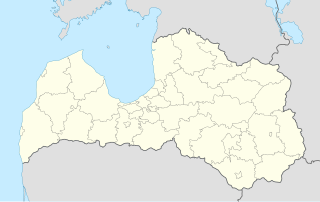 W
WThe Battle of Cēsis, fought near Cēsis in June 1919, was a decisive battle in the Estonian War of Independence and the Latvian War of Independence. After heavy fighting an Estonian force moving from the north, supplemented by Latvian units, repelled Baltic German attacks and went on full counter-attack.
 W
WThe Christmas Battles were offensive operations of the Russian army and Latvian units during World War I in the area of Jelgava, Latvia, by the Russian 12th Army of the Northern Front. They took place from December 23 until December 29, 1916 according to the calendar used in Russia at the time, The Army was commanded by Gen. Radko Dimitriev; it was opposed by the 8th German Army.
 W
WThe Courland Pocket was an area of the Courland Peninsula where a group of Nazi German forces from the Reichskommissariat Ostland was cut off and surrounded by the Red Army for almost a year, lasting from July 1944 until May 1945.
 W
WBattle of Daugavpils was the final battle in the Polish-Soviet campaign of 1919. A joint Polish and Latvian force, operating under Polish Staff orders known as "Operation Winter", attacked the Red Army garrison in Dunaburg, or Daugavpils, from 3–5 January 1920.
 W
WThe Crossing of the Düna took place during the Great Northern War on July 19 1701 near the city of Riga, present-day Latvia. The Swedish king Charles XII was in hot pursuit of king Augustus II the Strong of the Polish–Lithuanian Commonwealth and Saxony. The crossing was easily made, and the coalition troops were quickly broken and retreated.
 W
WThe Forest Brothers were Baltic and Estonian partisans who waged guerrilla warfare against Soviet rule during the Soviet invasion and occupation of the three Baltic states during, and after, World War II. Similar anti-Soviet Central and Eastern European resistance groups fought against Soviet and communist rule in Bulgaria, Poland, Romania, and western Ukraine.
 W
WThe Battle of Jelgava was an operation of the Latvian Army from 15 to 21 November 1919 during the Latvian War of Independence. The Latvian Army forced the units of the Western Russian Volunteer army subordinated to the Weimar Republic to leave Jelgava. Because of this attack, the German Government's intention to start ceasefire talks and reach agreement on the further political status of Courland and Zemgale with Latvian Provisional Government failed.
 W
WThe Barricades were a series of confrontations between the Republic of Latvia and the Union of Soviet Socialist Republics in January 1991 which took place mainly in Riga. The events are named for the popular effort of building and protecting barricades from 13 January until about 27 January. Latvia, which had declared restoration of independence from the Soviet Union a year earlier, anticipated that the Soviet Union might attempt to regain control over the country by force.